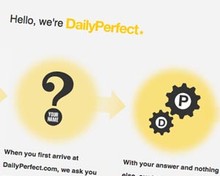
The idea of personalising news, removing the news agenda from the hands of the editors and into those of the readers, is not new - recommended article links and 'most emailed' lists are a starting point.
But the new wave of personalisation technologies could marry aggregation with personalised advertising, in a way which does not invade an individual reader's privacy, says Louis Kanganis, CEO of personalisation technology company Daily Perfect.
The site is currently a showcase of the company's technology and demonstrates how it can work for publishers. It was initially developed as part of plans to build a better news site, he explains.
But, adds Kanganis: "It dawned on me that the core technology here was a little bit broader than just working in a news aggregation. Perhaps the company should extract out the technology, which is essentially a set of profiling algorithms, and apply them in a lot of different areas - any area where someone is trying to reach a different person with a customised message."
As such, Daily Perfect's technology, which uses publicly available online information to build up profiles matched to people's names, could be used for e-commerce and advertising.
Targeted advertising opportunities
Publishers are interested in using the personalisation feature for better presentation of their content to their audience, but could also use it for more targeted advertising, says Kanganis.
"It's a very privacy friendly approach. We're not dropping cookies anywhere, doing anything strange or questionable. We're gathering information from (…) the openness of the social networks and the willingness of people to put themselves out there - it's a different culture," he says.
The technology is available as an API allowing publishers to use the service in partnership with Daily Perfect. A newspaper site, for example, would be able to secure a new reader or an existing reader and pass the information it holds on them to Daily Perfect's engine.
The service would then be able to return profile-matching content with substantial accuracy - selected from the range of more than 10,000 sources it uses, says Kanganis.
Customising content in this way leads to more pages visited and more interaction with a news site, which in turn could provide fertile ground from targeted advertising: "It should improve all the metrics that publishers want to see for readers coming to the site."
"There's not necessarily a perfect overlap between the type of content someone might want to read and the kind of advertising that they might like, find relevant or might click on. Using a targeting technology such as we've developed could possibly expand your revenue stream as a publisher," says Kanganis.
"Publishers have a lot of information based on what customers are reading. They're usually only tracking the activity on their own site, so they're not really capturing necessarily the whole profile of that reader that encompasses all the different aspects of their life.
"I do think there's an opportunity to learn more about your readers that could help the overall aggregation and presentation of content, but also present a potential revenue opportunity around advertising that doesn't really violate anyone's privacy, so would be ok with the publishers."
Kanganis concedes that the technology isn't always 100 per cent accurate in what it returns; for example, there's some commonality of names.
But it is a bidirectional system that can learn over time, he says. Publishers using it will be able to suggest a 'cold-start' set of topics to readers, but can help refine the algorithms by returning more information about readers' profiles.
Can news be over-customised?
Returning a more personalised selection of articles, content and, indeed adverts, is possible, but is there a danger in customising news until it is out of context?
Kanganis is familiar with the argument: "The world is getting more granular and customised. I'm not sure one can really fight that trend.
"Perhaps there is a landing page where it's the news that the editor thinks is most important, but perhaps there's another area readers can subscribe - to a feed that provides a little bit more of a customised glimpse that is perhaps suited to a bite-size mode of consumption."
Free daily newsletter
If you like our news and feature articles, you can sign up to receive our free daily (Mon-Fri) email newsletter (mobile friendly).









